- Home
- Quizzes
- My Quiz Activity
- Newsletters
- Sports Betting
- MY FAVORITES
- Add Sports/Teams
- SPORTS
-
NFL
- NFL Home
- Arizona Cardinals
- Atlanta Falcons
- Baltimore Ravens
- Buffalo Bills
- Carolina Panthers
- Chicago Bears
- Cincinnati Bengals
- Cleveland Browns
- Dallas Cowboys
- Denver Broncos
- Detroit Lions
- Green Bay Packers
- Houston Texans
- Indianapolis Colts
- Jacksonville Jaguars
- Kansas City Chiefs
- Las Vegas Raiders
- Los Angeles Chargers
- Los Angeles Rams
- Miami Dolphins
- Minnesota Vikings
- New England Patriots
- New Orleans Saints
- New York Jets
- New York Giants
- Philadelphia Eagles
- Pittsburgh Steelers
- San Francisco 49ers
- Seattle Seahawks
- Tampa Bay Buccaneers
- Tennessee Titans
- Washington Commanders
-
MLB
- MLB Home
- Arizona Diamondbacks
- Atlanta Braves
- Baltimore Orioles
- Boston Red Sox
- Chicago White Sox
- Chicago Cubs
- Cincinnati Reds
- Cleveland Guardians
- Colorado Rockies
- Detroit Tigers
- Houston Astros
- Kansas City Royals
- Los Angeles Angels
- Los Angeles Dodgers
- Miami Marlins
- Milwaukee Brewers
- Minnesota Twins
- New York Yankees
- New York Mets
- Oakland Athletics
- Philadelphia Phillies
- Pittsburgh Pirates
- San Diego Padres
- San Francisco Giants
- Seattle Mariners
- St. Louis Cardinals
- Tampa Bay Rays
- Texas Rangers
- Toronto Blue Jays
- Washington Nationals
-
NBA
- NBA Home
- Atlanta Hawks
- Boston Celtics
- Brooklyn Nets
- Charlotte Hornets
- Chicago Bulls
- Cleveland Cavaliers
- Dallas Mavericks
- Denver Nuggets
- Detroit Pistons
- Golden State Warriors
- Houston Rockets
- Indiana Pacers
- Los Angeles Clippers
- Los Angeles Lakers
- Memphis Grizzlies
- Miami Heat
- Milwaukee Bucks
- Minnesota Timberwolves
- New Orleans Pelicans
- New York Knicks
- Oklahoma City Thunder
- Orlando Magic
- Philadelphia 76ers
- Phoenix Suns
- Portland Trail Blazers
- Sacramento Kings
- San Antonio Spurs
- Toronto Raptors
- Utah Jazz
- Washington Wizards
-
NHL
- NHL Home
- Anaheim Ducks
- Arizona Coyotes
- Boston Bruins
- Buffalo Sabres
- Calgary Flames
- Carolina Hurricanes
- Chicago Blackhawks
- Colorado Avalanche
- Columbus Blue Jackets
- Dallas Stars
- Detroit Red Wings
- Edmonton Oilers
- Florida Panthers
- Los Angeles Kings
- Minnesota Wild
- Montreal Canadiens
- Nashville Predators
- New Jersey Devils
- New York Islanders
- New York Rangers
- Ottawa Senators
- Philadelphia Flyers
- Pittsburgh Penguins
- San Jose Sharks
- Seattle Kraken
- St. Louis Blues
- Tampa Bay Lightning
- Toronto Maple Leafs
- Vancouver Canucks
- Vegas Golden Knights
- Washington Capitals
- Winnipeg Jets
- NCAAF
- NCAAM
- Boxing
- Entertainment
- Lifestyle
- Golf
- MMA
- Soccer
- Tennis
- Wrestling
- More Sports
- RESOURCES
- My Account
- YB on Facebook
- YB on Twitter
- YB on Flipboard
- Contact Us
- Privacy Policy
- Terms of Service
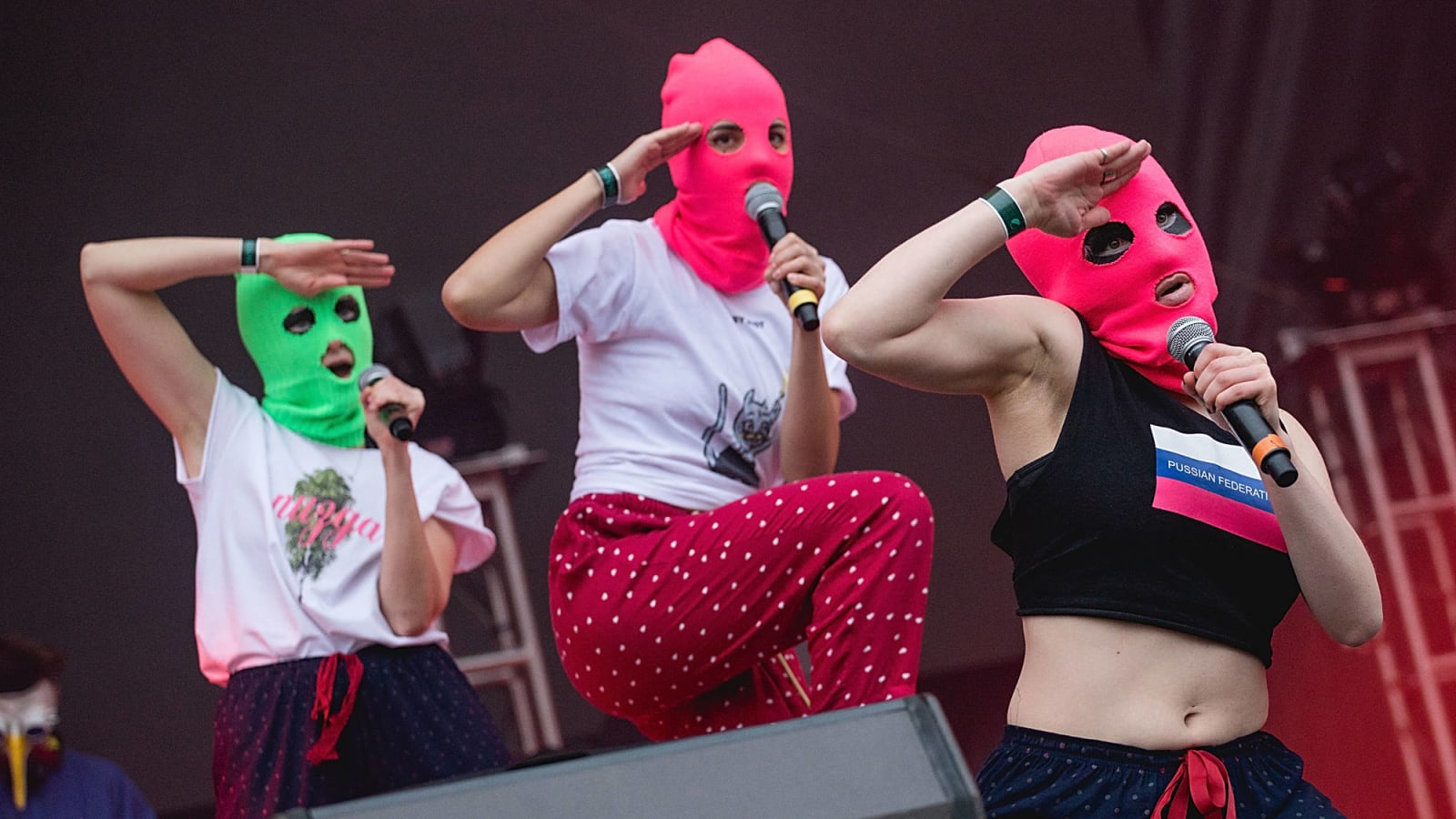
Rock bands that never shied away from politics
Rock and roll shook up the world in the 1950s as the sound of youthful rebellion, but in the early days it was all about sex and fast cars and just plain having a good time. It wasn't until the mid-1960s, basically around the time protest folkie Bob Dylan went electric, that this quintessentially American musical genre became the sound of political change. In time, the country's most subversive cultural export inspired artists all over the world to rock out in support of all manner of political issues. The rock-and-roll rebellion will come home to roost in March when the Russian punk outfit Pussy Riot begins an eleven-city North American tour. In honor of their righteous agitation, here are twenty rockers who've never backed down from a political fight.
Midnight Oil
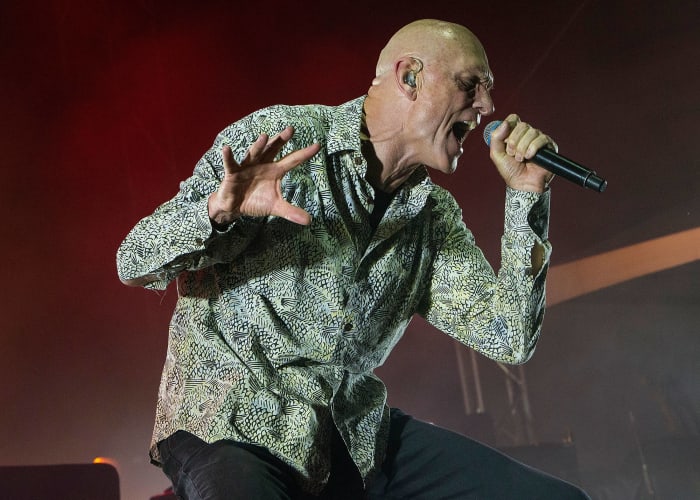
The Australian rock band led by dynamic front man Pete Garrett has passionately championed political causes both local (Aboriginal rights) and global (climate change, nuclear disarmament and various antiwar efforts) with hit songs like “Beds Are Burning,” “The Power and the Passion” and “Blue Sky Mine.” Garrett walks the walk, too. He was a member of the Australian Parliament for nine years, where he has fought for the same causes highlighted by the band in song.
Rage Against the Machine

The rap metal revolutionaries from Los Angeles exploded onto the scene in the 1990s with an assortment of radical socio-political views. From their self-titled debut LP to classics like “Evil Empire” and “The Battle of Los Angeles,” front man Zack de la Rocha and guitarist Tom Morello have spoken out in support of the far-left Zapatista Army of National Liberation, and assailed the U.S. government for its military interventions abroad and its adherence at home to bad-faith capitalism.
The Clash

The leftist punk rock collective led by singer Joe Strummer and guitarist Mick Jones attacked issues of class and race right out of the gate on their self-titled debut album. The band threw off the shackles of punk and embraced a more sophisticated sound with their classic double LP “London Calling,” which features songs about fighting the country’s increasingly conservative status quo, the evils of consumerism and, a bit ahead of their time, safe sex. Their next album – “Sandinista!” – voiced support for the far-left rebels of Nicaragua. The Clash were a righteous band of principal until they broke up in 1986.
Dead Kennedys

The radicalism is right there in the tasteless moniker. According to lead singer Jello Biafra, the band’s name wasn’t an insult to the misfortune-plagued political family, but rather a statement on “the end of the American Dream.” Their first single, “California Über Alles,” caused a stir in 1979 by attacking the perceived fascist inclinations of the state’s governor Jerry Brown. Songs like “Holiday in Cambodia,” “Kill the Poor” and “Nazi Punks F*** Off!” were no less confrontational. Biafra’s legendary battle with the Parents Music Resource Center nearly landed him in jail for obscenity.
U2
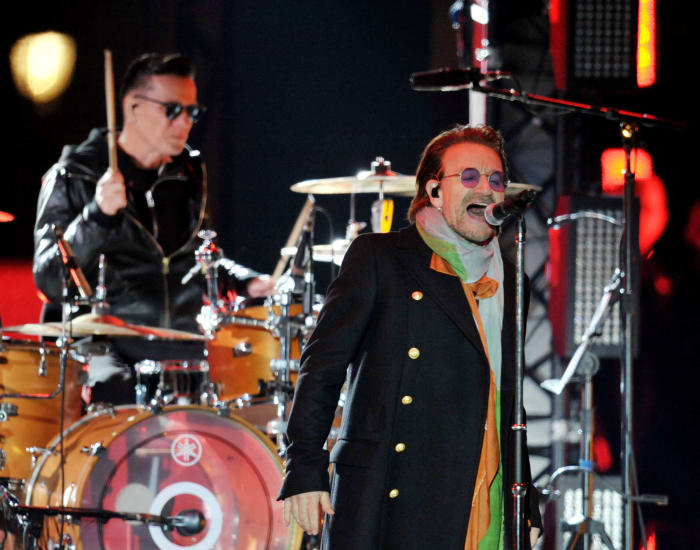
The Irish foursome kicked off their career writing songs about their Christian faith, but as 'The Troubles' worsened in their home country during the early 1980s, they felt compelled by conscience to come off the sidelines. Their third LP “War” takes on everything from the 1972 Bloody Sunday massacre to Polish Solidarity to nuclear war. It was the first salvo in a battle for peace, love and understanding that is now in its fourth decade.
Living Colour
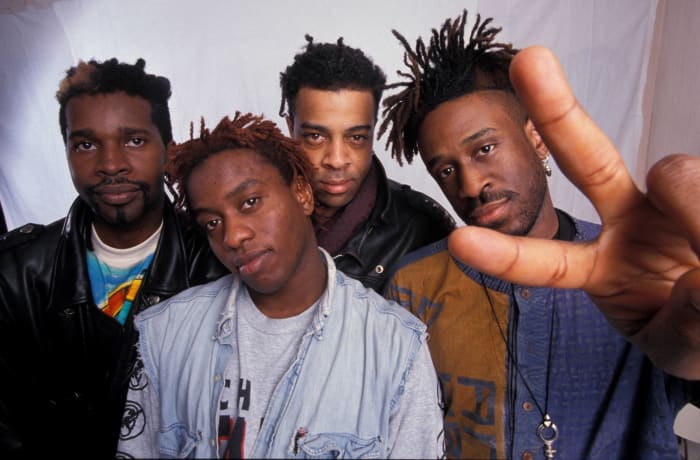
As an all-black hard rock band in the late ‘80s, Living Colour’s very existence was political. The band’s first single was one of the most overtly political songs to ever crack the Billboard Hot 100 – and its fiery rumination on the nature of political celebrity is more relevant today than it was thirty years ago. Virtuoso lead guitarist Vernon Reid co-founded the Black Rock Coalition to promote rock artists of color in 1985. He’s also one of the more entertainingly outspoken musicians on Twitter.
Neil Young

Here’s a rocker who’s never backed down from a political brawl. Young got his start with Buffalo Springfield, playing guitar on the seminal 1960s counterculture hit “For What It’s Worth.” In the immediate aftermath of the 1970 Kent State massacre, he wrote one of the angriest protest songs ever recorded in “Ohio.” Young has also taken aim at consumerism, the crass commercialization of music (which got him temporarily banned from MTV) and just about every war fought by the U.S. He called in song for the impeachment of President George W. Bush, and is predictably lobbing sonic grenades at the current commander-in-chief (via his latest LP, “The Visitor”).
Green Day

The neo-punk trio from California’s Bay Area dabbled in politics on their first six LPs, but they went full-blown radical in 2004 with the punk rock opera “American Idiot.” Furious over President George W. Bush’s leadership of the United States, Billy Joe Armstrong and company took on the Iraq War and the nationalistic fervor that had seemingly driven the country mad in the wake of 9/11. The band has maintained their political focus ever since, most recently on their anti-establishment 2016 LP “Revolution Radio.”
Bruce Springsteen

Bruce Springsteen has evolved from troubadour of the workingman to chronicler of male midlife ennui to the liberal boomer conscience of rock-and-roll (okay, he shares that title with Neil Young). He’s never been afraid to get political (he often monologued about Woody Guthrie before performing “This Land Is Your Land” during concerts in the 1980s), but somewhere between the recording of his Pete Seeger tribute album in 2006 and the election of Donald Trump, the activist within him has roared to life.
Pussy Riot
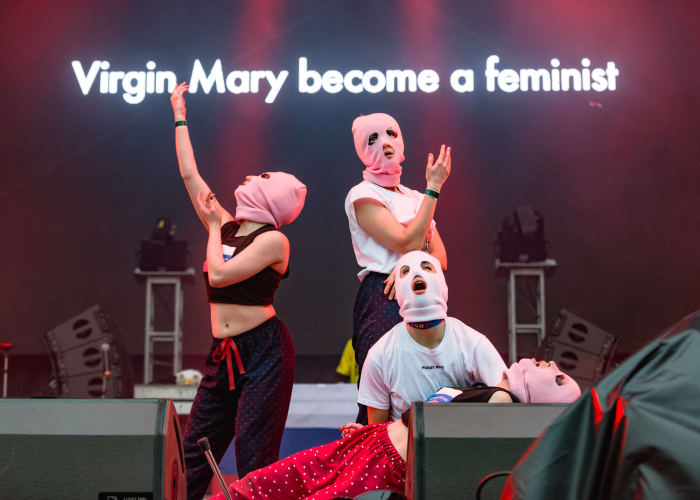
Living in a country where opposition leaders, journalists and vocal members of the LGBTQ community disappear or die under mysterious circumstances with alarming frequency, it takes a lot of chutzpah for punk rockers Pussy Riot to keep the heat on Russian President Vladimir Putin. Members Maria Alyokhina and Nadezhda Tolokonnikova received two-year jail sentences for a staging an anti-Putin protest at Moscow’s Christ the Savior Cathedral in 2012. Just this week, Olga Borisova and two other members were detained in Crimea for suspicious “medical testing”.
Enter Shikari
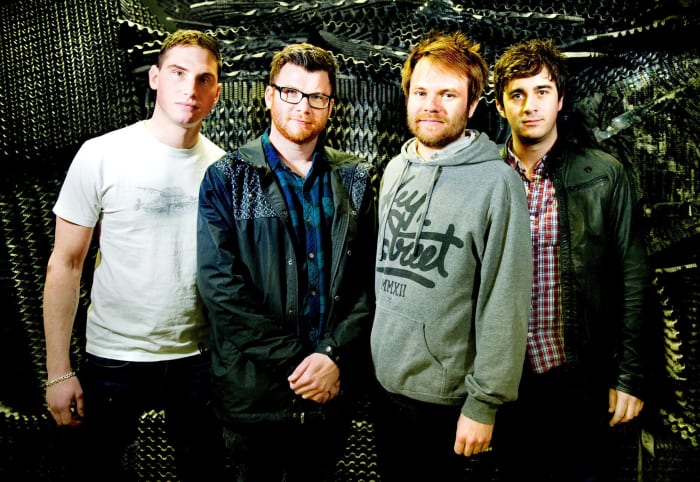
This British alternative rock band has gotten increasingly political over the years, going after the capitalism, the privatization of England’s National Health Service, nuclear proliferation and, as is the style of the day, President Donald J. Trump. Though front man Rou Reynolds tackles more personal issues like depression and anxiety in his music, he believes that the band’s music would just be “noisy pop” without the social commentary.
The Beatles

Collectively, The Beatles were political in that they used their immense popularity to introduce new ideas and sounds into the global culture. Individually, some were more outspoken than others. John Lennon was clearly the bomb thrower of the group, inviting boycotts over his “more popular than Jesus” remark in 1966. He also was the antiwar conscience of the band, whereas George Harrison was its humanitarian. After their breakup, Harrison did phenomenal work combating hunger and poverty in conjunction with UNICEF.
Sinéad O'Connor
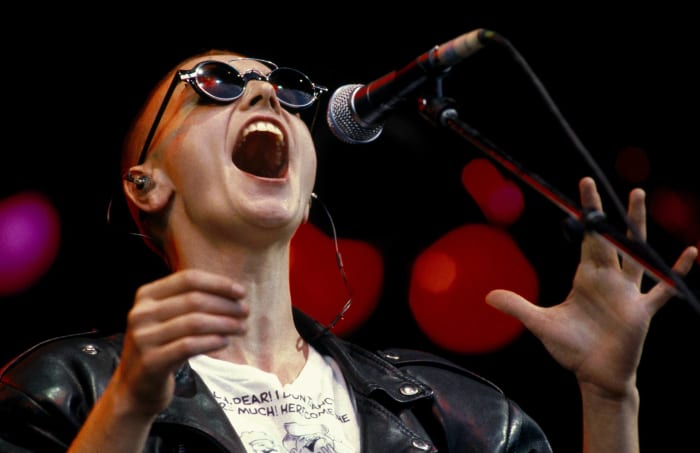
When you go on “Saturday Night Live” and tear up a picture of the Pope, you’re instantly enshrined in the no-Fs-to-give hall of fame. Sinéad O’Connor’s political fearlessness has been both an artistic strength and a personal struggle, but to her everlasting credit she has never ceased to speak her mind. When she refused to allow “The Star-Spangled Banner” to be performed before a Saratoga, New York concert in 1990, Frank Sinatra threatened to “kick her in the ass.” That episode would probably play out quite differently today.
Roger Waters

Pink Floyd was more metaphysical than political, which was probably guitarist David Gilmour’s influence. Once Roger Waters left the band, his political activism gradually came to the fore in his nihilistic solo LP – “Radio K.A.O.S.” – which took aim at Prime Minister Margaret Thatcher, capitalism and nuclear proliferation. In 1990, he organized a performance of “The Wall” to commemorate the fall of the Berlin Wall, then recorded the 1992 album “Amused to Death” to protest both the Tiananmen Square massacre and the Gulf War. He’s still at it today, fiercely criticizing Israel and any musician who chooses to perform there (e.g. Bon Jovi).
Patti Smith

Patti Smith has long been a political provocateur on the rock-and-roll scene, dating back to her controversial 1978 song “Rock and Roll N***er”. An outspoken champion of feminist and progressive causes, Smith campaigned for Green Party presidential candidate Ralph Nader in 2000 and 2004, and has been a fierce supporter of WikiLeaks founder Julian Assange. She certainly doesn’t stake out popular political positions.
Kathleen Hanna

This third-wave feminist and riot grrrl pioneer been a fervent champion of women’s reproductive rights and marriage equality for over twenty years. As a woman in the male-dominated world of punk rock, she made it her mission to make sure her female fans felt safe at her shows by adopting a “girls to the front” policy; this way, they didn’t have to worry about being knocked around in the macho jostling of the mosh pit. The Bikini Kill front woman is still fighting the righteous (and forward-thinking) fight, recently speaking out against trans-exclusionary feminists.
Funkadelic

The rock-and-roll half of George Clinton’s P-Funk brain, Funkadelic was more about conscience altering than raising, but few rock bands were more outspoken on the topics of inner city poverty and the Vietnam War – most notably on the somber “March to the Witch’s Castle,” which tells of a returned soldier’s struggle with heroin addiction as he attempts to readjust to a society that has rejected him. Funkadelic’s juvenile antics could overshadow its political messaging at times, but even the silliness felt radical.
Ani DiFranco

The adventurous singer-songwriter has dabbled in multiple musical genres, but regardless of her sound she’s remained consistent in her support of liberal grassroots political causes, and, in particular, the LGBTQ community. DiFranco set an inspiring example in the early 1990s by self-publishing her own music under her Righteous Babe label. Politically, she’s a hardcore environmentalist, an avowed humanist and a vigorous proponent of women’s rights.
Yegor Letov
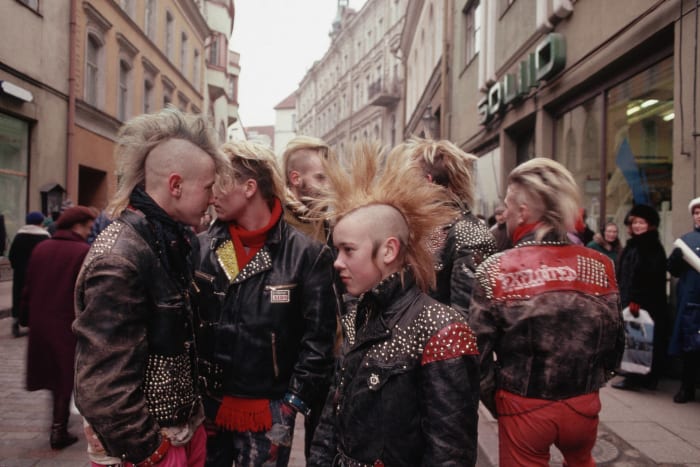
The “Father of Russian Punk," Yego Letov was mercilessly harassed by the KGB during the 1980s for writing and performing music that was harshly critical of the oppressive Communist leadership of the Soviet Union. The frontman of Grazhdanskaya Oborona was at one point committed to a mental institution for his dissident activities. After the break up of the U.S.S.R. (and before his untimely death at the age of forty-three in 2008), Letov reversed course ideologically and became a vocal leader of the National Bolshevik Party.
Sex Pistols

The punk rock pioneers causes a scandal in 1977 England with the lyrics “God save the Queen/She ain’t no human being/And there’s no future/In England’s dreaming.” The anarchic group had more in common politically with the Marx Brothers in that whatever the issue was, they were most assuredly against it. Still, this was an insanely radical stance to take in the late 1970s, and it emboldened a whole generation of rockers to speak their mind repercussions be damned.
Jeremy Smith is a freelance entertainment writer and the author of "George Clooney: Anatomy of an Actor". His second book, "When It Was Cool", is due out in 2021.
More must-reads:
Trending in Entertainment
Customize Your Newsletter
 +
+
Get the latest news and rumors, customized to your favorite sports and teams. Emailed daily. Always free!
Use of this website (including any and all parts and
components) constitutes your acceptance of these
Terms of Service and Privacy Policy.

